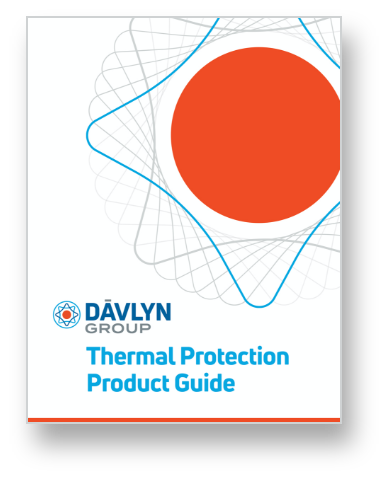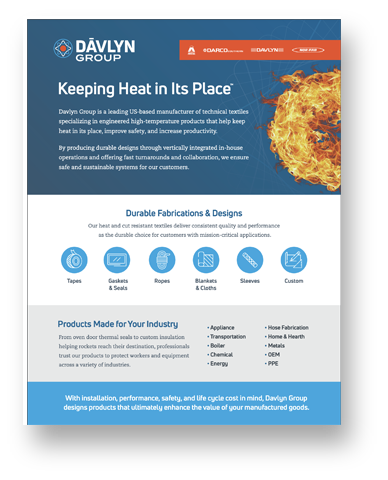If you work in the heavy industry sector, you’re likely familiar with specialized thermal industrial fabrics. Finding heat-resistant materials that are durable, practical, and easy to work with can take some extra research and effort.
Enter fiberglass, a proven industrial insulation material that can take many forms for various industrial applications. Fiberglass possesses chemical properties that are variable depending on its intended purpose. This versatile material can be used to make anything from a home’s roof, electrical cable insulation, and bathtub to supercars, aircraft, and boats.
Several industries employ fiberglass because it is both highly durable and lightweight. A common application of fiberglass is in the production of fiber yarn, an industrial fabric favored for its functionality in the form of cloths, tapes, ropes, sleeving, and gaskets. Other common industrial applications of fiberglass come in forms like fiberglass insulation tape, fiberglass rope, fiberglass sleeves, and fiberglass gaskets.
Consider fiberglass for your next industrial project by reviewing seven of its most advantageous industrial characteristics.
7 Industrial Advantages of Heat-Resistant Fiberglass
- High-Temperature Resistance & Strength
- Superior Electrical Insulation
- Low Moisture Absorption
- High Resistance to Industrial Chemicals
- Exceptional Strength to Weight Ratio
- Dimensional Stability
- Flexibility with Other Materials
High-Temperature Resistance & Strength
Due to its composite, inorganic nature, fiberglass can withstand some of the most extreme temps while still maintaining its form. Fiberglass can retain 50% of its strength at 700° Fahrenheit (371° Celsius) and 25% of its strength at 1000° Fahrenheit (538° Celsius), making it ideal for industrial use. Fiberglass is favored across several industries for its flexibility, which means it’s an easy material to manipulate into practically any shape or size. But in addition to its limber qualities, it’s also incredibly durable, ranking more rigid than steel as a material offering the seamless intersection of form and function.
Is Fiberglass Insulation Flammable?
Because of its unique chemical makeup, fiberglass is non-flammable, high-heat friendly, and maintains its shape even when exposed to extreme temperature changes. These are just a few qualities that make it an engineering favorite for heat containment functionality.
Superior Electrical Insulation
With its flexible nature, fiberglass insulation tape is a practical option for sealing and insulating cylindrical materials. It’s commonly used to protect hoses, electrical cables, and other items from heat. It works well for insulation, even when used in thin quantities. Tapes constructed from fiber yarns make it possible to seal and protect items from extreme temperatures, and because fiberglass is fireproof, it gives professionals great peace of mind when working with fire safety concerns. Its strength, flexibility, and low moisture absorption are also crucial traits that make it great for electrical work.
Insulate and protect with the best. Try Davlyn Group’s industrial fabrics to safeguard your hoses, electrical cables, and industrial equipment. Learn more about electrical insulation and wire protection.
Low Moisture Absorption
Not only is fiberglass extremely resilient to heat elements, but it can be a good line of defense against moisture to keep equipment dry and safe. The fiber yarn materials used to make fiberglass ropes and tapes are made of noncellular fiber materials, meaning they have very low moisture retention or absorption. This feature of fiberglass can prevent mold and water exposure issues in many unique industrial applications.
High Resistance to Industrial Chemicals
Since fiberglass is entirely artificial, it doesn’t come with the same concerns as organic materials. Thanks to its low moisture absorption, you don’t have to worry about rotting, mildew, or deterioration. It will not react to chemicals or most acids, except hydrofluoric and hot phosphoric acid. This makes fiberglass industrial materials incredibly practical and worth the investment compared to other materials requiring frequent replacement or those that quickly fall apart from chemical exposure. Avoid hazardous chemical exposure for your personnel, equipment, and workspaces with fiberglass products that mitigate chemical exposure and decay.
Exceptional Strength to Weight Ratio
Fiberglass, despite being stronger than steel, is exceptionally lightweight. An example of one of its most ideal qualities, fiberglass’s light weight makes it easy to work with while remaining durable. Fiberglass industrial materials are twice as strong as steel wire. Unlike steel wire, fiberglass textiles aren’t rigid and can be shaped according to your needs. Davlyn Group offers a wide selection of high-performance industrial fabrics that can hold their weight and more.
Dimensional Stability
Unlike organic materials, fiberglass will not shrink over time or warp when exposed to temperature fluctuations. Fiber yarns make strong industrial fiberglass tapes and ropes that won’t stretch or shrink due to atmospheric conditions. The nominal elongation at break is 3 to 4%, and the average linear thermal expansion coefficient of bulk E-glass is 5.4 x 10-6 cm/cm/°C. Get industrial materials that maintain their structural integrity by exploring the possibilities of fiberglass for your project.
Flexibility with Other Materials
You can adjust the chemical composition of fiberglass depending on its intended use. It comes in many forms and can be mixed with various materials, such as synthetic resin and cement. The same goes for fiberglass textiles; they can be adjusted in strength, size, and makeup, depending on the desired end use.
A common form of industrial fiberglass is silicone-coated fiberglass, which can create superior insulation qualities. Products manufactured with premium quality fiberglass and silicone rubber are both non-flammable and self-extinguishing.
Silicone-coated fiberglass products, like Davlyn Group’s firesleeves and fireblankets, are used in a number of industries, including aerospace, automotive, locomotive, heavy equipment, metals, iron and steel, hose fabrication, welding and metal fabrication, oil and gas, and OEM. A firesleeve protects all classes of hoses, wires, and cables. A fireblanket receives a thick coating of self-extinguishing silicone rubber that withstands liquid metal splash, flame, slag, sparks, and other hazards in the toughest of industrial environments.
Davlyn Silco™ silicone-coated fiberglass firesleeves and fireblankets have become an industry standard. Some thermal heat protection applications of fiberglass and silicone products include:
- Hose and cable heat and flame protection
- Insulation and heat containment
- Welding, heat, spark, and molten splash shield
- Employee and personnel safety
How Silicone-Coated Fiberglass Creates Superior Thermal Heat Protection
Equipment
Using fiberglass and silicone together protects hydraulic hoses, lines, cables and wiring, and other critical components from the hazards of intense heat, sparks, and direct flame. Molten metal splashes are deflected at 2200°F (1200°C) while providing constant heat protection up to 500°F (260°C). These materials are resistant to hydraulic fluids, fuels, lubricating oil, and water. A braided firesleeve provides a high level of protection in critical areas potentially exposed to intense fire conditions, such as an oil line inside of an engine compartment. A knitted firesleeve is commonly used in industrial applications for hose and cable protection. A fireblanket also shields cables, hoses, and equipment from splashes of molten metal and heavy sparks.
Durability
Fiberglass and silicone produce a lightweight and highly flexible product. The materials will not melt, burn, or combust. An added benefit is the absence of toxic smoke emissions. Using firesleeves with a hook and loop closure feature allows installation in situ. This heavy-duty industrial sleeving can be easily retrofitted into existing systems and in tight spaces. Fireblankets are resistant to ozone, abrasions, oxygen, light, and weather aging.
Safety
The combination of fiberglass and silicone in firesleeves and fireblankets protects individuals against burns. Because of their enhanced heat and flame protection, fireblankets are used to provide shielding for worker life safety, especially in welding or fabrication applications.
Consider Fiberglass Materials for Your Next Industrial Project
Fiberglass is not only structurally flexible but also offers flexibility in how and what it is used for. Davlyn Group offers high-quality fiberglass industrial materials and textiles—including fiberglass cloths, tapes, ropes, sleeving, and gaskets—to facilitate high performance and ultimate protection for your personnel and equipment.
Starting a project, or want to learn more about using industrial fiberglass textiles? Get in touch to discuss fiberglass and heat containment solutions with the experts at Davlyn Group. We specialize in heat containment and stand by the quality and integrity of our products.
Sources:



